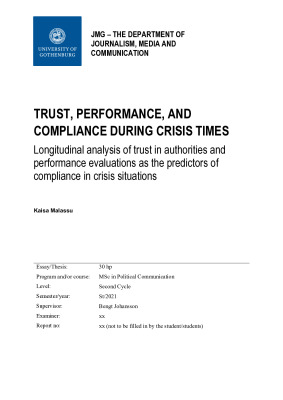TRUST, PERFORMANCE, AND COMPLIANCE DURING CRISIS TIMES
Longitudinal analysis of trust in authorities and performance evaluations as the predictors of compliance in crisis situations
While the concepts of trust and performance often appear together in research,there seems to be little consensus on how they together relate to compliance.
The purpose of this study is to examine this relationship, how it changes over time, and to question the common idea of trust being one of the main predictors of compliance in crisis situations, suggesting that performance evaluations might play a bigger role than often thought. This study argues for the role of performance evaluations in determining compliance and aims to test this argument through quantitative longitudinal analysis.
An extensive literature review is conducted to conclude what is already known on the relationship between trust and compliance, trust and performance
evaluations, and performance evaluations and compliance. Three lines of previous research are recognised; performance evaluations as a type of trust, i.e., confidence, performance evaluations preceding trust through trustworthiness, and performance evaluations as an antecedent of reputation.
The mechanisms of trust and performance evaluations affecting compliance are discussed and two main frameworks are recognised; trust affecting performance evaluations, which then affect compliance, or performance evaluations affecting trust and thus affecting compliance. The different theories are discussed and compared. Hypotheses and a conceptual model are formed based on the previous literature.
Method: A three-wave panel data collected in Sweden during the COVID-19 pandemic in 2020 is used to conduct a statistical analysis on the relationship between the independent variables of trust in authorities and performance evaluations, and the dependent variable of compliance. Logistic regression model (n= 4,187) is constructed to analyse the change in variables during the course of the three panel waves. A measure of social distancing is used as the dependent compliance variable, and the relationship is controlled with general trust, sex, age, and education level.

